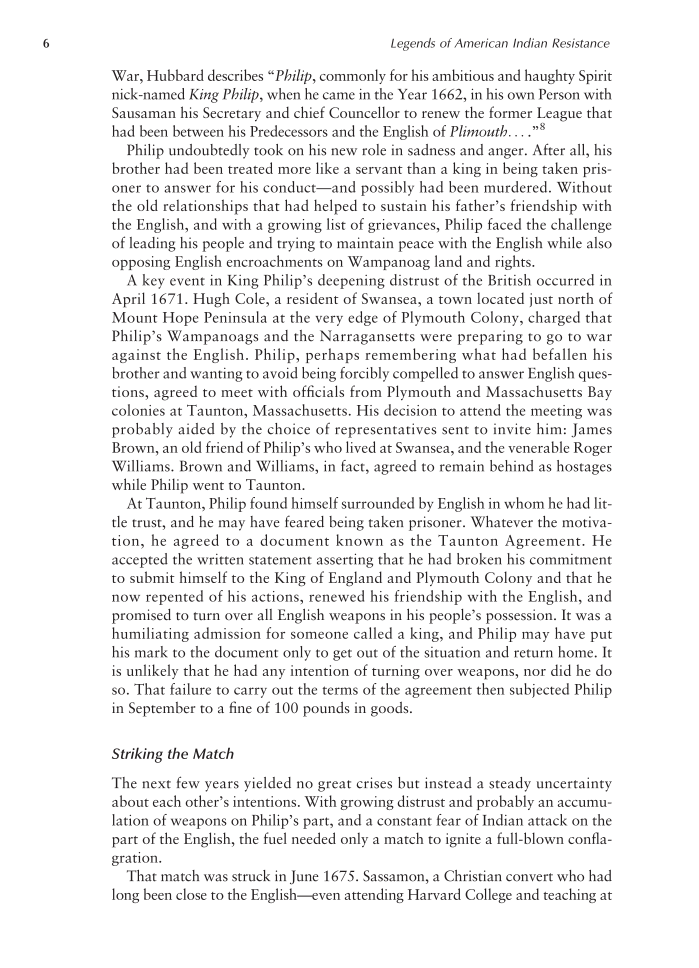War, Hubbard describes “Philip, commonly for his ambitious and haughty Spirit nick-named King Philip, when he came in the Year 1662, in his own Person with Sausaman his Secretary and chief Councellor to renew the former League that had been between his Predecessors and the English of Plimouth... .”8 Philip undoubtedly took on his new role in sadness and anger. After all, his brother had been treated more like a servant than a king in being taken pris- oner to answer for his conduct—and possibly had been murdered. Without the old relationships that had helped to sustain his father’s friendship with the English, and with a growing list of grievances, Philip faced the challenge of leading his people and trying to maintain peace with the English while also opposing English encroachments on Wampanoag land and rights. A key event in King Philip’s deepening distrust of the British occurred in April 1671. Hugh Cole, a resident of Swansea, a town located just north of Mount Hope Peninsula at the very edge of Plymouth Colony, charged that Philip’s Wampanoags and the Narragansetts were preparing to go to war against the English. Philip, perhaps remembering what had befallen his brother and wanting to avoid being forcibly compelled to answer English ques- tions, agreed to meet with officials from Plymouth and Massachusetts Bay colonies at Taunton, Massachusetts. His decision to attend the meeting was probably aided by the choice of representatives sent to invite him: James Brown, an old friend of Philip’s who lived at Swansea, and the venerable Roger Williams. Brown and Williams, in fact, agreed to remain behind as hostages while Philip went to Taunton. At Taunton, Philip found himself surrounded by English in whom he had lit- tle trust, and he may have feared being taken prisoner. Whatever the motiva- tion, he agreed to a document known as the Taunton Agreement. He accepted the written statement asserting that he had broken his commitment to submit himself to the King of England and Plymouth Colony and that he now repented of his actions, renewed his friendship with the English, and promised to turn over all English weapons in his people’s possession. It was a humiliating admission for someone called a king, and Philip may have put his mark to the document only to get out of the situation and return home. It is unlikely that he had any intention of turning over weapons, nor did he do so. That failure to carry out the terms of the agreement then subjected Philip in September to a fine of 100 pounds in goods. Striking the Match The next few years yielded no great crises but instead a steady uncertainty about each other’s intentions. With growing distrust and probably an accumu- lation of weapons on Philip’s part, and a constant fear of Indian attack on the part of the English, the fuel needed only a match to ignite a full-blown confla- gration. That match was struck in June 1675. Sassamon, a Christian convert who had long been close to the English—even attending Harvard College and teaching at 6 Legends of American Indian Resistance
Document Details My Account Print multiple pages
Print
You have printed 0 times in the last 24 hours.
Your print count will reset on at .
You may print 0 more time(s) before then.
You may print a maximum of 0 pages at a time.










































































































































































































































































































































































